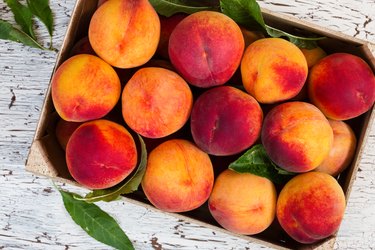
If you're dealing with a stomach ulcer, chances are you're experiencing some pain and discomfort. Thankfully, there are several foods that alleviate the pain of an ulcer. Add them to your diet and talk with your doctor for additional treatment.
What Is a Stomach Ulcer?
Video of the Day
A stomach ulcer, also known as a peptic ulcer, is a sore in your stomach lining or duodenum (the beginning of the small intestine). Though rare, ulcers may also develop in the esophagus.
Video of the Day
The National Institute of Diabetes and Digestive and Kidney Diseases (NIDDK) says peptic ulcers can be caused by long-term use of nonsteroidal anti-inflammatory drugs (NSAIDs) such as ibuprofen, naproxen and aspirin, H. pylori bacterial infection and a rare condition called Zollinger-Ellison syndrome (ZES) that causes tumors in the stomach, pancreas or duodenum.
Food for Ulcer Relief
Though the American College of Gastroenterology (ACG) indicates no need to follow a specific diet plan for a stomach ulcer, research shows that adding food for ulcer relief to your diet can help heal the ulcer faster. Foods that alleviate the pain of an ulcer include the following.
- Foods Rich in Polyphenols: A June 2015 review in World Journal of Gastroenterology examined the role of polyphenols in peptic ulcer management. The extensive review confirmed dietary polyphenols have both protective and therapeutic potential for peptic ulcers. According to a November 2010 study in the European Journal of Clinical Nutrition, the richest dietary sources of polyphenols are cloves, dried peppermint, star anise, cocoa powder, celery seed, dark chocolate, flaxseed, blueberries, many types of seasonings, fruits and vegetables.
- Fermented Foods: Fermented foods such as yogurt, kimchi, sauerkraut, miso, kefir and kombucha are rich in probiotics. A July 2016 review published in Frontiers in Microbiology concluded that in vitro and in vivo experiments and in clinical trials suggest probiotics have anti-H.pylori effects.
- Foods High in Flavonoids: In a March 2009 review published in Molecules, flavonoids act as gastroprotective and help heal gastric ulcers. The compounds have therapeutic potential for treating ulcers caused by H.pylori. Dietary sources of flavonoids include chocolate, berries, wine, onions, cabbage and plums.
Read more: Remedies for Ulcer Pain
Nonfood Treatment Options
If dietary measures don't provide the quick ulcer pain relief you're looking for, there are medicinal treatments available to help. Treatment varies depending on the type and cause of the ulcer, but will generally include acid reducing medications.
The AGC says nearly all peptic ulcers can be treated with a proton pump inhibitor (PPI). These drugs, such as omeprazole (Prilosec), Iansoprazole (Prevacid) and pantoprazole (Protonix) can be given in an IV for hospitalized patients with bleeding ulcers or by mouth as a pill. For the medication to be effective, patients must eat within 30 minutes to one hour after taking it to activate.
Duodenal ulcers are sometimes treated with H2 blockers, which are another type of acid reducer. Commonly used H2 blockers are ranitidine (Zantac) and famotidine (Pepcid).
If the ulcer is caused by long-term NSAIDs use, patients should discuss alternative pain relief options with their healthcare provider. If caused by H. pylori, the infection needs to be treated with antibiotics.
Ulcer Pain Relief at Night
When seeking ulcer pain relief at night, take an over-the-counter acid reducer or another antacid. Eat a small meal shortly before bed, as the pain tends to be worse when the stomach is empty. Avoid stomach irritants such as alcohol and caffeine. Work as many foods that don't irritate gastric ulcers as possible into your diet, especially in your evening meal.
- National Institute of Diabetes and Digestive and Kidney Diseases: "Definition and Facts for Peptic Ulcers (Stomach Ulcers)"
- American College of Gastroenterology: "Peptic Ulcer Disease"
- World Journal of Gastroenterology: "Role of Dietary Polyphenols in the Management of Peptic Ulcer"
- European Journal of Clinical Nutrition: "Identification of the 100 Riches Dietary Sources of Polyphenols: An Application of the Phenol-Explorer Database
- Mayo Clinic: "Prebiotics, Probiotics and Your Health"
- Frontiers in Microbiology: "Fermented Foods: Are They Tasty Medicines for Helicobacter pylori Associated Peptic Ulcer and Gastric Cancer?"
- Molecules: "Flavonoids with Gastroprotective Activity"
- Oregon State University Linus Pauling Institute Micronutrient Information Center: "Flavonoids"